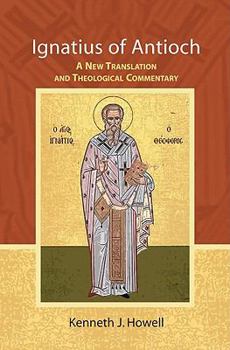Ignatius of Antioch: A New Translation and Theological Commentary
One cannot understand the early Church or Catholicism today without understanding St. Ignatius of Antioch. The man who succeeded St. Peter as bishop of Antioch and was the spiritual son of St. John... This description may be from another edition of this product.
Format:Paperback
Language:English
ISBN:0980006600
ISBN13:9780980006605
Release Date:April 2008
Publisher:C H Resources
Length:141 Pages
Weight:0.40 lbs.
Dimensions:0.5" x 5.2" x 7.8"
Customer Reviews
2 ratings
Then will I be a true disciple
Published by Thriftbooks.com User , 15 years ago
Few stories of the early church are as moving and revealing as the epistles written by the bishop Ignatius before his execution by wild beasts in the arena in about 117AD. Ignatius writes with a passion and an understanding of an imitation of Christ in His suffering that few can understand. Ignatius' words ring down through the centuries as an example of a life of total loving submission to God. He speaks to us not only of that love and faith that few of us will attain but also gives intriguing clues on the nature of the Church. One of the earliest heresies to confront the Church was Docetism which denied the incarnation and taught that Jesus only appeared to be present in human form but actually did not suffer and die. It was a denial of the God-man nature of Christ that made his death meaningless. Dr. Howell does a wonderful job of pointing out the key distinctives of this heresy and the many references Ignatius makes to it. In the process we see how clearly Ignatius taught the importance of the authority of the Church in her organization and in the importance of the real presence of Christ in the Eucharist. The Docetists did not believe in the real presence in the Eucharist because they did not believe in the real presence of Christ. Ignatius reminds his readers that if Christ was not really present, then His death and our celebration of the Eucharist is indeed in vain. Themes such as this reveal the influence of the apostle Paul's theology on Ignatius and gives us the thread of that teaching back to the apostles to Ignatius and others. Understanding this yields a clearer understanding of Ignatius' letter to the Smyrneans when he remarks about the heretics that, "They abstain from the Eucharist..because they do not confess that the Eucharist is the flesh of our Savior Jesus Christ." To reduce the Eucharist to a mere symbolic practice would remove the significance it has in Ignatius' argument against heresy. Another theme that comes through strong is the importance of unity. And not just unity in a spiritual sense of one universal (catholic) church of all believers but in a very tangible sense of unity under the authority of the bishop, presbyters (priests), and deacons. He goes so far as to say that, "Where the bishop is...there is the Church." He reminds his readers all to be in unity in submission under the bishop. He even goes so far as to say, "Do not be deceived my brothers! If someone follows a schismatic, he will not inherit the kingdom of God." Ignatius' letters are peppered with reminders of seeking unity through the authority of the bishop, presbyters, and deacons as the rightful authorities set in place by God through apostolic succession. Anyone outside that authority has removed himself from the Church and cannot partake of the life-giving graces entrusted to that Church. Ignatius' letters are particularly important records of the early church in light of the reformation. For to Ignatius, unity under th
The Faith of Ignatius Explained
Published by Thriftbooks.com User , 15 years ago
Mr. Howell does a thorough explanation of the faith of Ignatius from the perspective of the tradition of the catholic church, particularly in regard to the sacrament of the eucharist, the authority of the bishop, presbyters and deacons, and the esteemed character of the church at Rome. The martyrdom of Ignatius, and the role of suffering in unitng the believer to discipleship in Jesus is well explained. The letters are a moving testimony to the faith and practice of the church in the first century. A must read for the catholic or orthodox believer.





